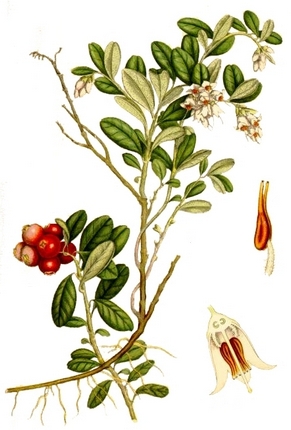Red bilberry – The vitisidaea Vaccinium.
Evergreen shrub height of 25-30 cm, families brusnichnыh (Vaccinaceae). For medical purposes harvested leaves and berry plants.

The chemical composition of cranberries
Leaves cranberries contain phenolic glycosides - arbutin and metilarbutin; vaccinin, lycopene, hydroquinone derivatives, ursolic, vynnuyu, Gauls, Quinic and allagovuyu acid, tannin, hyperoside and other flavonoids. Berries cranberries contain large amounts of sugar, ascorbic acid and carotene, organic acid (Citric, apple, shtavelevaya, benzoic et al.).
The pharmacological properties of cranberries
Herbal medicines from the leaves of bilberry have disinfectant, a diuretic and choleretic effect due to the content in the plant a significant amount of arbutin. Hydrolysis is split into arbutin hydroquinone, who gives a pronounced bactericidal and diuretic effect. Besides, antiseptic leaves cranberries due to tannic compounds, which also possess anti-inflammatory and bactericidal properties. Catechol substances reduce permeability and capillary fragility. The diuretic effect of lingonberry leaves increased with concomitant administration with other diuretics (bearberry leaves, kidney tea). The diuretic effect of bearberry more pronounced due to the high content of arbutin and tannins in it.
The use cranberries in medicine
Herbal medicines from the leaves of bilberry are used as a diuretic, zhelchegonnoe, antiseptic and astringent in diseases of the kidney and bladder (eg, when pielitah, clean, urolithiasis), gastroenteritis, putrid diarrhea, flatulence and chronic constipation.
Leaves cranberries in the form of decoctions and teas used in diseases, related to the violation of the mineral; exchange, particularly gout, osteochondrosis, and rheumatoid, infectious nonspecific arthritis.
Berries cranberries have antiseptic properties and vitamin. Their use in food in its raw form, and for manufacturing dietary products. Leaves and fruits cranberries are used for beriberi C and A. The aqueous extract of fruits quenches thirst, so he was appointed febrile patients. Besides, infusion of berry cranberries has a slight laxative effect.
Formulations cranberries, Dosing and Administration
Decoction of leaves cranberries: 6 g (2 tablespoons) the leaves are placed in an enamel bowl, Pour 200 ml (1 glass) hot boiled water, capped and heated in boiling water (in a water bath) 30 m, cooled at room temperature for 10 m, filter. The remaining raw materials squeeze. The volume of the resulting broth bring boiled water to 200 ml. Broth store in a cool place no more 2 d.
Apply for 1/2-1/3 cup 2-3 times a day.
